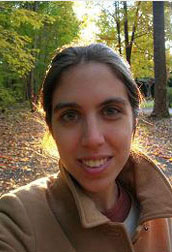
MUSEUM STUDIES
Theory… and the People Who Love It by Brittany Lewis

I like museum theory. On the one hand, it's so practical and obvious, and on the other hand, actually enlightening. The first-semester theory class is Management and Leadership, wherein we talk about everything from mission statements and institutional vision to audience collaboration and hiring practices. That last one, I admit, I never would have expected. You hire the person best qualified for the job, right? Ah, but there's possibly more to qualification than what a resume reflects. Surprise—this is where the enlightening part comes in! Even better is discussing these topics on a peer level with my classmates. If you're like me, you know what it feels like to be the only person around who is interested in museums. After years of history classes with students going into all kinds of careers, I finally have classmates who can compare experiences with mine, who have opinions, who want to talk about museums. And it feels great.
Of course, discussion happens in any graduate-level class, but many of our professors have us carry the discussions to the internet. Blackboard is an academic communication service that UNCG subscribes to, and all three of my classes this semester participate in internet discussion boards there. In my theory class, we use the space to reflect on the readings and chat about the topics. It helps my understanding to find out, before coming to class, what others thought was important, what hit home and what was off-base.
My most memorable, heated Blackboard discussion was about diversity hiring practices. If you start with the premise that the audience needs to see itself represented in the museum in everything from subject matter to staffing, it follows that museums should strive for a racially diverse staff. Most discussions about diversity hiring assume the practice necessitates the sacrifice of “scholarship,” whatever that may be. Some of us made the same assumption and blamed education and low minority interest for keeping racial minorities out of the museum field. Others pointed out that qualified minority candidates are easy to find if one cares enough to search for them—it does not have to be a trade-off. We stressed the actual benefit of a diverse staff to all involved to emphasize why an employer would make the extra effort to locate minority applicants. We also saw that qualifications extend beyond academic expertise to include communication skills, community contacts, and relevant life experience. Can we insist scholarly credentials trump all else in a pool of applications?
The issue of diversity hiring is still unsettled, and our choices as future professionals will shape the field's approach. My classmates, as you can imagine, passionately argued both sides of the issue, and I eagerly checked the discussion every hour to see if my main “opponent” had updated our debate. We never settled on an answer, but that wasn't the point. Most importantly, we each found something in what others might term a boring theory class that made us feel strongly. Museums are definitely places of controversy, battlegrounds in an ongoing tug-o-war for meaning. I find the idea fascinating, and I'm happy to make my own academic tugs against people who will tug back.